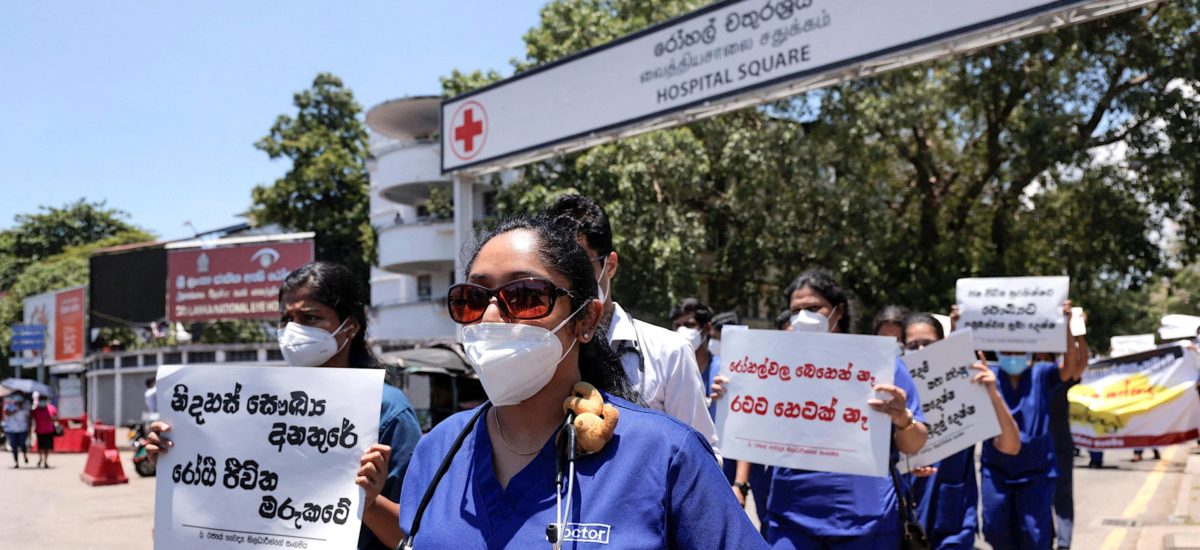Photo courtesy of Daily Sabah
In the backdrop of the upcoming presidential and parliamentary elections, pivotal moments are anticipated that will shape Sri Lanka’s future. Amid this evolving landscape, the voices leading change – women, trans, human rights defenders and activists – take centre stage.
Sri Lanka saw months of civil unrest at the peak of the economic crisis, culminating in the ouster of President Gotabaya Rajapaksa when thousands of protesters took to the streets. Regressive government policies and inadequate social protection left many Sri Lankans at risk from the worst effects of the country’s economic crisis, Human Rights Watch said in its World Report 2024.
“Millions of Sri Lankans are struggling to survive an economic crisis that partly originated in corrupt, unaccountable governance,” said Meenakshi Ganguly, Deputy Director for Asia at Human Rights Watch. “The current administration is responding with policies that weigh heaviest on those who have least, while suppressing voices that are essential for accountable, democratic decision-making.”
Sri Lanka’s inflation eased for the first time in five months in February on the back of a stronger currency and slower gains in food prices. In presenting the 2024 Budget in parliament in November, 2023 President Ranil Wickremesinghe faced the dual challenges of maintaining public support and meeting IMF obligations to pave the way for the second tranche of IMF funds, worth about $337 million. The funds were ultimately disbursed in December 2023.
The government’s approval rating was at a low of 9 percent in October 2023 compared to 21 percent in June of the same year as presidential elections are set to take place in 2024. The budget included increased cost of living allowances for public sector employees, public pensioners, people with disabilities and senior citizens as well as ambitious tax revenue goals. In the budget, there was no clarity on how the government aims to find the extra revenue. To fully recover from the crisis, stronger domestic revenues are necessary. The IMF’s recent review considers tax revenues a key priority.
Various efforts have been made to increase investments. France, along with India and Japan, has initiated a joint debt restructuring negotiation programmme to support the debt restructuring process. Japanese Finance Minister Suzuki Shunichi termed the launch of this programme as “a historical development.” But China, the largest bilateral creditor, declined to participate and decided that it would only assist bilaterally. The US too has been at the forefront of extending assistance to Lanka. US Development Finance Corporation loans worth $553 million to develop a deep water shipping container terminal in the port of Colombo is evidence of a loan that doesn’t balloon debt but is private sector investment for a profitable project. This is a Build-Operate-Transfer (BOT) project undertaken by India’s Adani Group, its local partner John Keells Holdings and the Sri Lanka Ports Authority (SLPA) with an investment of over $700 million.
However mere investments are not enough; a lot still needs to be done for its citizens to ensure direct welfare. Once considered one of the best in the region, Sri Lanka’s healthcare system is ailing, laid low by the exodus of hundreds of doctors and, with patients left languishing, experts are calling on the government to act to stop the loss of talent. More than 1,700 medical officers have left over the past two years, according to the Government Medical Officers’ Association trade union, dealing a heavy blow to the health system on which most of the country’s 22 million people depend. Most people cannot afford private healthcare and are dependent on the public sector, which provides nearly 95% of inpatient care and about 50% of outpatient care. Aside from the immediate effects on staffing at hospitals, the brain drain will also hit education as lack of expert staff and trainers will widen the gap in mentoring and training medical students. The government has been urged to offer benefits to make doctors stay but no substantial step has been taken yet.
The road to recovery is not a cake walk; it’s laden with grave challenges. Grassroots human rights defenders confront a challenging environment marked by human rights concerns and violations. The arbitrary use of emergency laws, particularly the Prevention of Terrorism Act (PTA), remains a significant problem. State surveillance, violence and censorship persist, especially in the North and East where dissent is met with shrinking space, arbitrary arrests and routine strip searches.
Activists in the North and East grapple with issues of dispossession, displacement and inadequate compensation. Illegal settlements, mass scale displacement and military occupation of citizens’ lands have left communities vulnerable, limiting their ability to seek justice.
Post war reconciliation remains fragile with unresolved issues related to accountability, justice and discrimination against minorities. Rising nationalism, land disputes, displacement, human rights violations and militarisation contribute to tensions and persecution of grassroots activists. Defenders advocating for vulnerable populations find themselves at the intersection of environmental and human rights crises, addressing challenges such as rising temperatures, landslides, drought and the impact of the climate crisis on the downtrodden marginalised communities.
With all the uncertainties, 2024 will be crucial for Sri Lanka as it gears up for the presidential elections. Containing public disaffection while ensuring that political uncertainty does not delay economic decision making is set to test the skills of even the most hardened and experienced political leaders.

